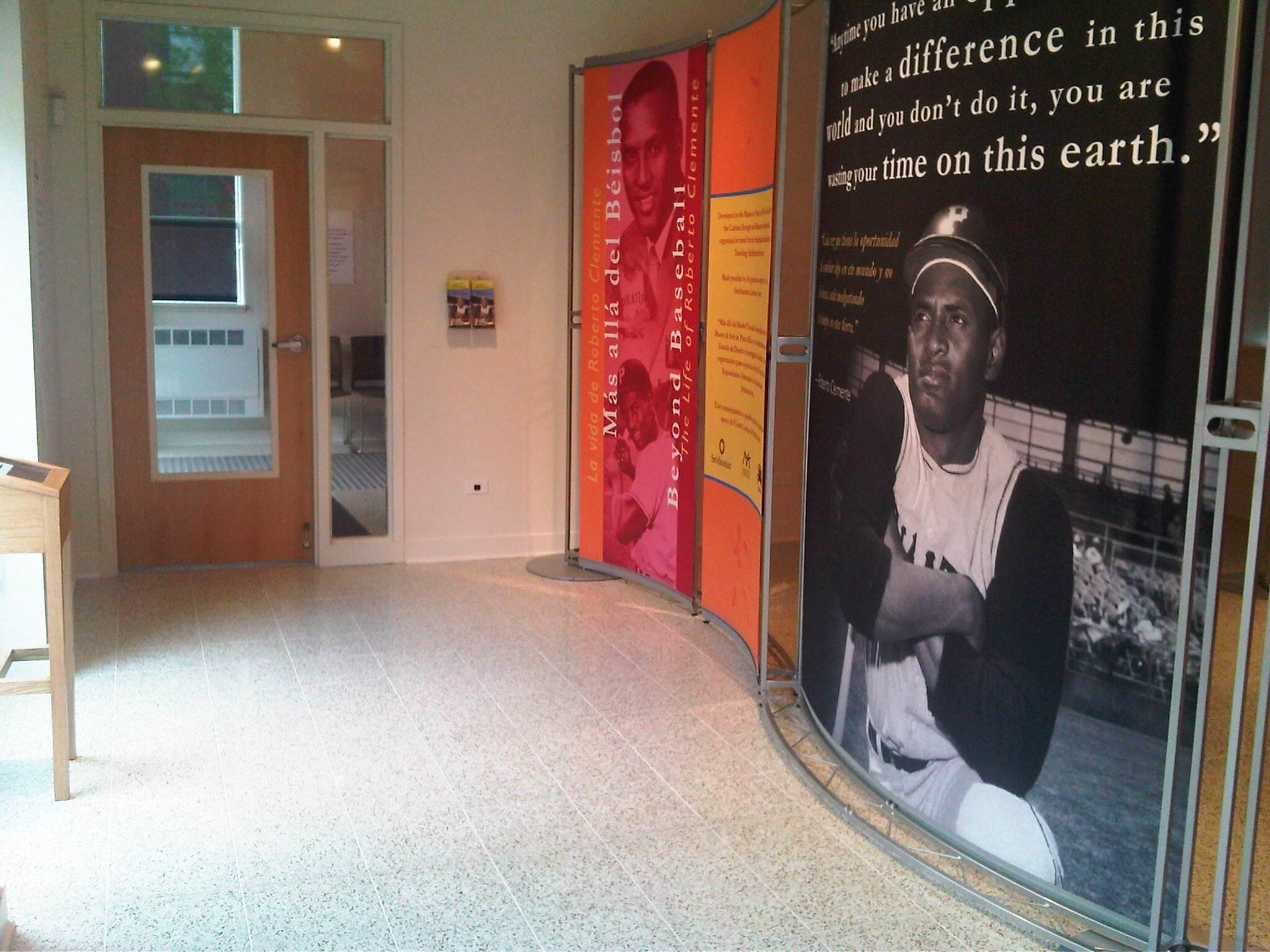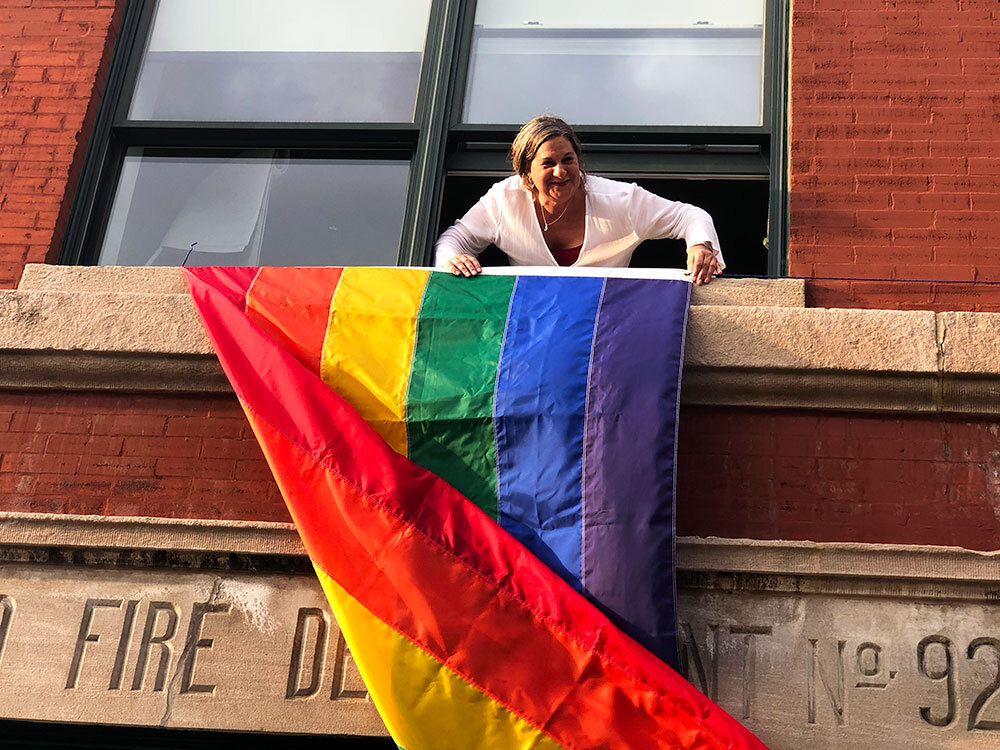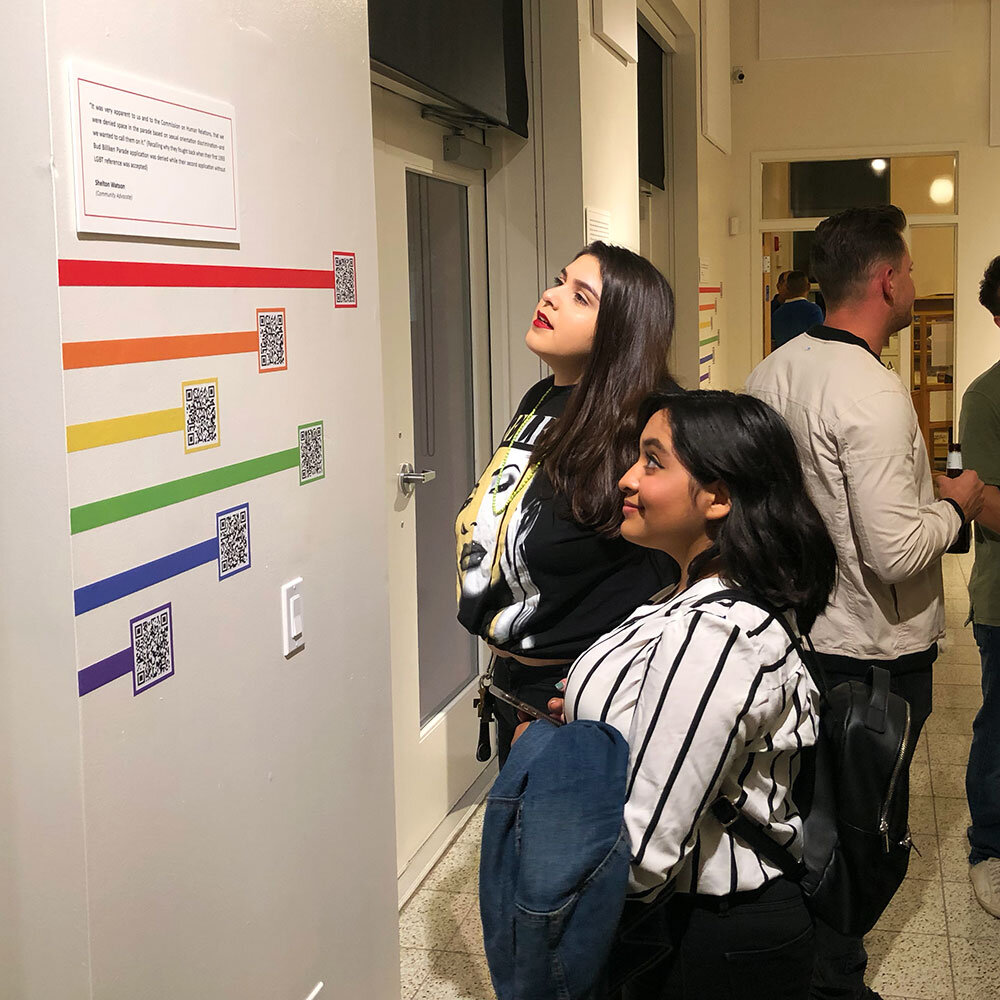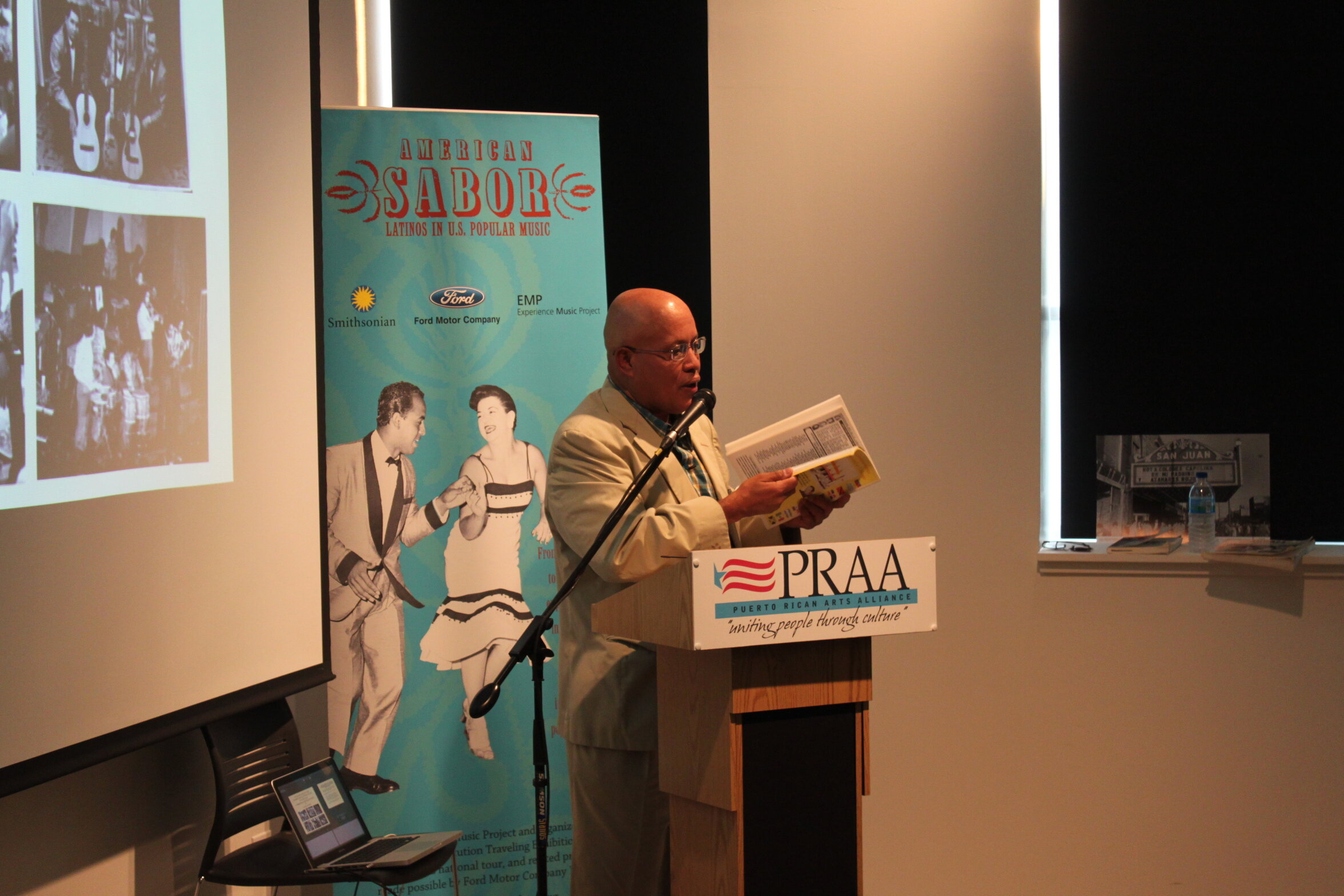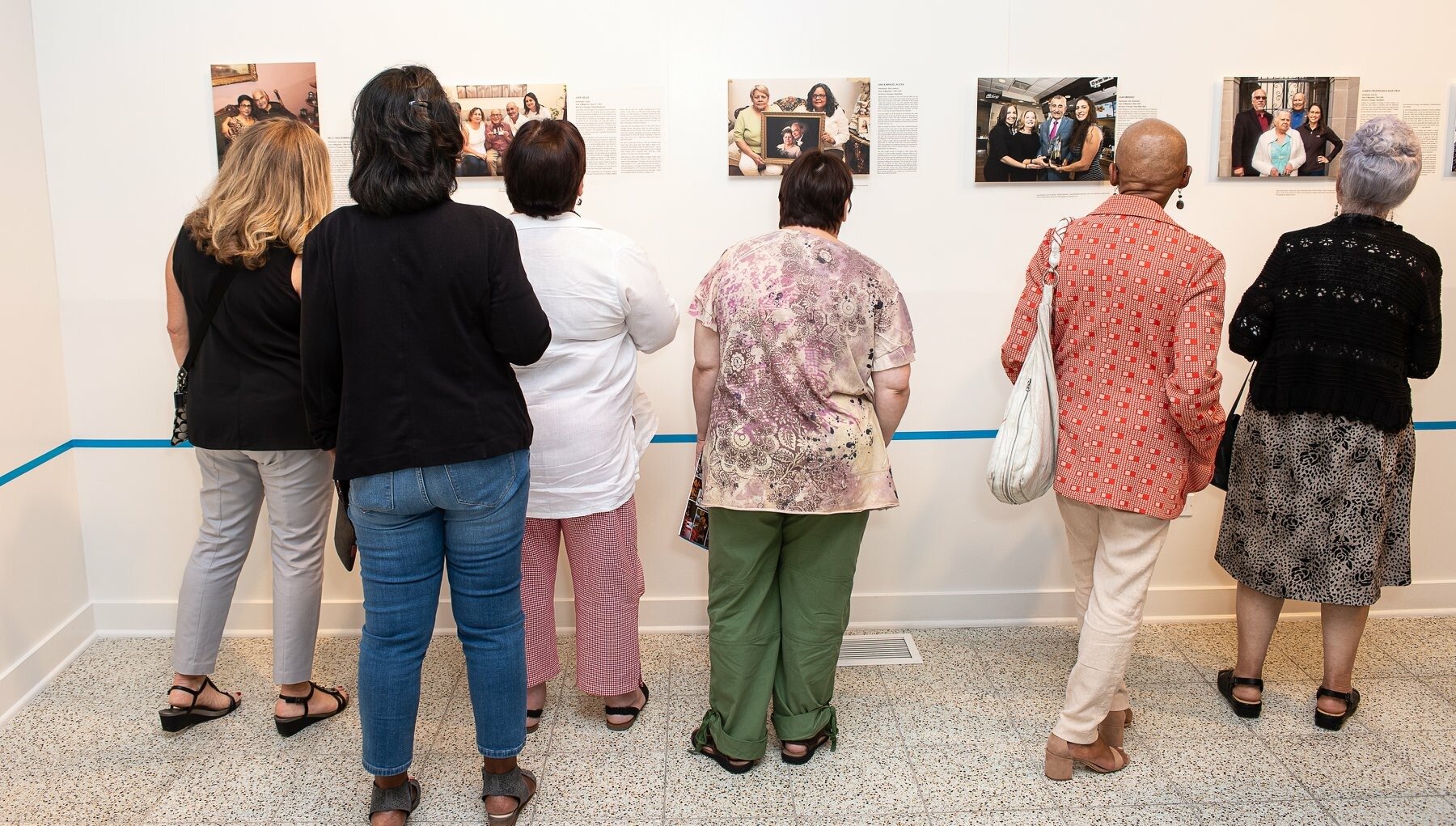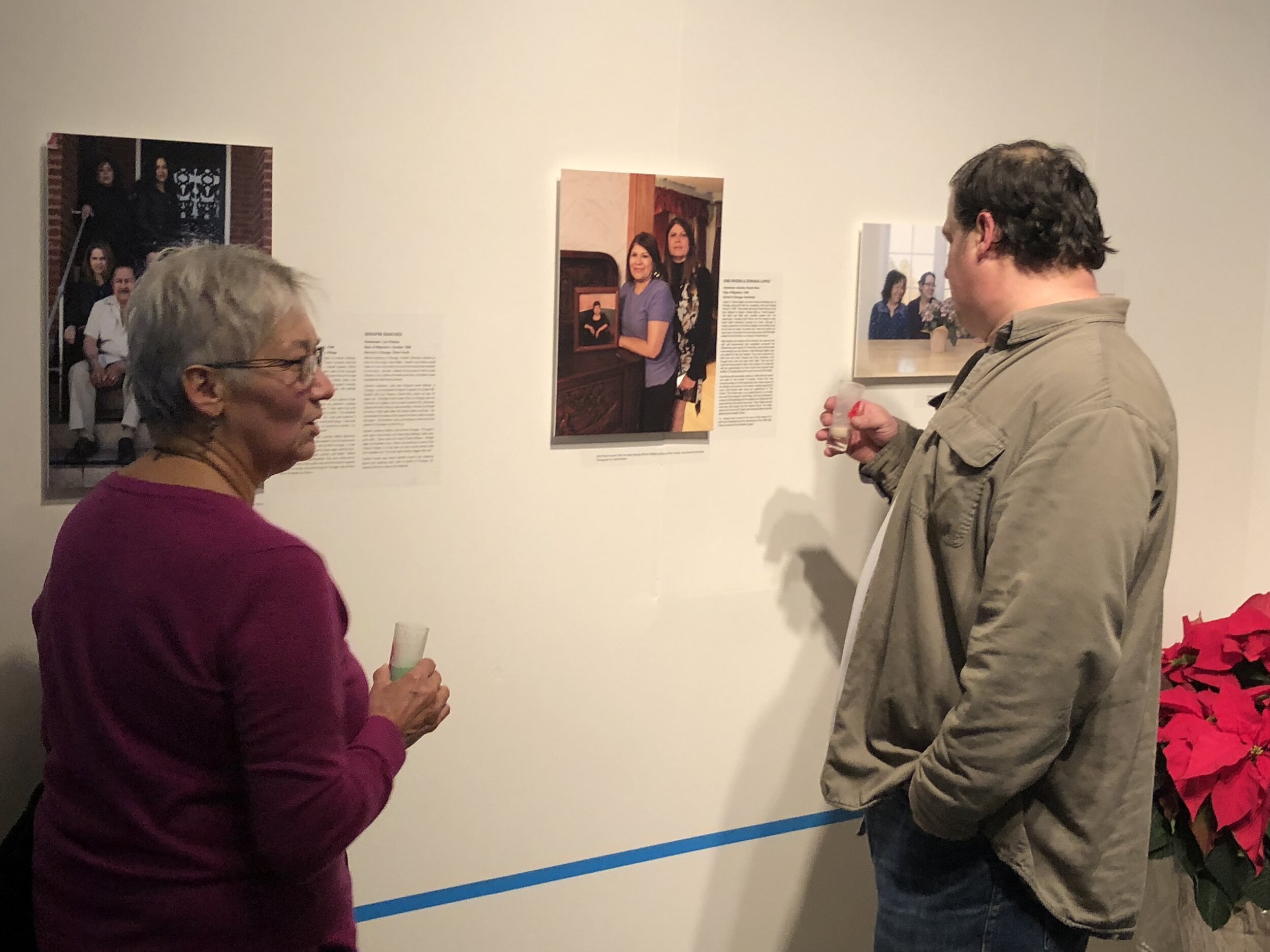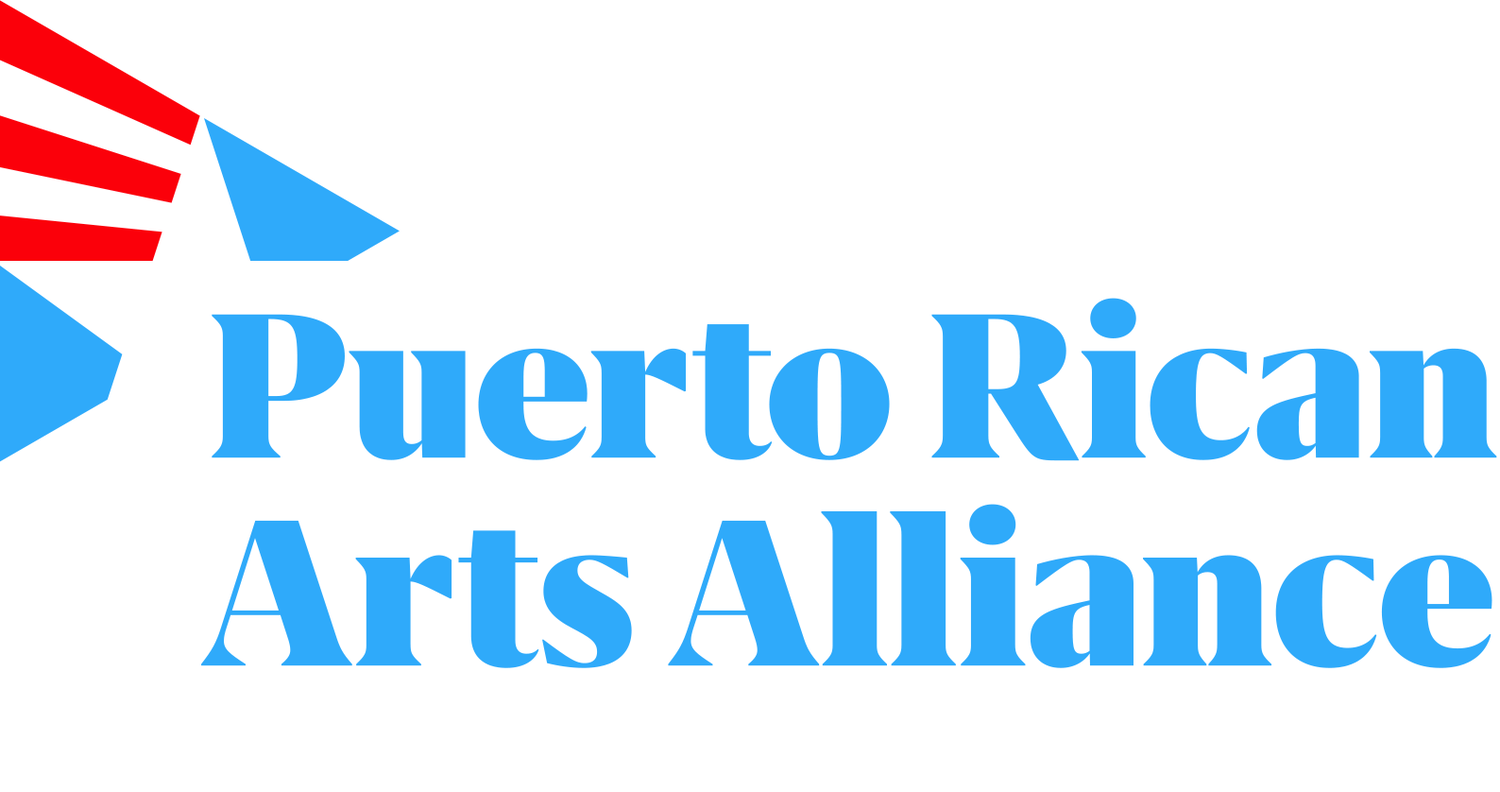
Exhibition &
Curatorial Program
↓ On View
↓ Upcoming Exhibitions
↓ Past Exhibitions
↓ Image LicensingPRAA’s Exhibition & Curatorial Program preserves and promotes Puerto Rican arts and history as a shared expression of our Chicago-Rican cultural experience. Our exhibition program develops curatorial projects, and presents traveling exhibitions showcasing local, Puerto Rico, and national artistic talent. Our program serves the cultural needs of our city and community in the Midwest thereby fostering cultural understanding about Puerto Rican arts and culture.
The Exhibition & Curatorial Program connects a national network of artists and artisans offering intellectually and artistically rich experiences that enhance and expand Chicago’s cultural life. PRAA holds partnerships with both Puerto Rico and national arts organizations and museums.
PRAA is not a museum but a cultural center that pledges to serve as a vibrant hub and destination for the presentation of compelling exhibition programming. Our strategic goals currently focus on developing a portal for the presentation of virtual exhibits and the development of a digital historic archive documenting the history of Puerto Ricans in the midwest. Come visit our gallery spaces located in Humboldt Park and Avondale neighborhoods:
The Studio Arts Community Gallery
(at the Humboldt Park Field House)
1440 N. Sacramento Ave. 2nd Floor, Chicago, IL 60622
For gallery hours call 773-342-8865 x104 or email: info@praachicago.org

On View
Colonial Portraits, Inc.
Click image to view full-size
Click image to view full-size
Click image to view full-size
Lobby @ Biblioteca Universidad Ana G. Méndez – Recinto Carolina
190 Km 1.8 00983, Carr. Boca De Cangrejos, Carolina, Puerto Rico
For library schedule call (787) 257-7373 x2504 y 2507
Colonial Portraits, Inc. (Retrato del Colonizado) is an album of painting reproductions of our Puerto Rican masters. Reproductions of portraits that defined the face and identity of the Puerto Rican people. Framed and contextualized by images of Puerto Rican natural disasters that in turn brought the people of Puerto Rico together.
Thirty teens and two teaching-artists from black and brown neighborhoods across Chicago worked with a project curator in defining the historical significance of the selected portraits. Teens reinterpreted while experimenting in a variety of techniques using acrylic mediums over artist board.
PRAA’s Studio Arts Program (SAP) is an after-school and summer apprenticeship program in residency at two locations, Humboldt Park Field House and the Roberto Clemente Community Academy.
Artists: Mara Ayala and Jennessa Martínez
Apprentices: Aisha Aich, Isabella Calderón, América Calvario, Dayana Contreras, Esteban Disimone, Tatiana Edwards, Eros Farfán, Isabella Guzmán, Cesia Hernández, Tyler Lucas, Angilee Mantilla, Emmanuel Mendoza, Jocelyn Mendoza, Julio Mendoza, Tabitha Moore, Jenille Morales, Kathya Orozco, Rodrigo Orozco, Eleni Pacheco, Yhan Ramos, Johanna Rodríguez, Bryan Román, Eduardo Román, Alejandro Sánchez, Erik Santiago, Norah Sinnokrot, Dinaluz Torres, Jesalí Torres, Abygail Tovar, Christine Vaerga
Colonial Portraits, Inc. (Retrato del Colonizado) es una instalación de pinturas inspiradas en retratos, que en los anales de nuestro entorno histórico han definido la identidad nacional del puertorriqueño. La exhibición es presentada desde la narrativa de desastres naturales que han afectado la isla y algún que otro desastre sociopolítico por manos del propio puertorriqueño. En conjunto la exhibición intenta representar ese anhelo que busca definir la identidad nacional.
La instalación es el trabajo de treinta jóvenes estudiantes de pintura trabajando bajo la supervisión de las artistas Mara Ayala y Jennessa Martínez. Esta muestra es un proyecto del Taller de Bellas Artes del Puerto Rican Arts Alliance en Chicago. La misión de este programa es entrenar a la nueva generación de artistas latin@s de Chicago desarrollando destrezas artísticas, dando entrenamiento, consejería y educación en las artes puertorriqueñas y Latinas.
Mapa de Historia (History Map)
In Puerto Rico there are over 8,000 structures that have been designated as heritage sites by the Institute of Puerto Rican Culture, the Planning Board and/or by the United States National Register of Historic Places. The designation recognizes values such as its architecture or construction materials, the people who inhabited it, the events that took place there, or its historical, cultural, artistic, tourist or scenic contribution. Most of our heritage buildings were constructed of wood and/or masonry and date from the mid-19th to early 20th centuries. These historic sites tell us the history of their community and provide a sense of place that is unique to each town.
Para la Naturaleza presents the documentary Map of History, an inventory of damage suffered in historic areas by María's passage through Puerto Rico. The production of the documentary for the Map of History project has been subsidized by the Puerto Rican Endowment for the Humanities and the National Endowment for the Humanities.
With a donation, you can support Para la Naturaleza's efforts towards environmental conservation and historical preservation. For more information visit: www.paralanaturaleza.org
Click here to view a presentation on Mapa de Historias: A Sample of Endangered Historic Sites in Puerto Rico
La Primera Parada | The First Pride ParadeChicago’s Stonewall Moments
Click image to view full-size
Click image to view full-size
@ PRAA Center Gallery
3000 N Elbridge Ave, Chicago, IL 60618
Phone: (773) 342-8865 x104
Gallery Hours: Tuesday to Friday: 11am to 5pm or by appointment
The Puerto Rican Arts Alliance joins the nation and the world in commemorating 50 Years of Stonewall with the exhibition La Primera Parada (The First Parade). The Stonewall events marked a turning point in Americans society and in this exhibit, we explore its impact in Chicago’s communities of color. La Primera Parada conveys the idea that we all have a defining ‘Stonewall Moment’ in our journeys of self-identification when we say “No More Silence” proudly walking in revelation of who we are and what we stand for.
La Primera Parada (The First Parade): Chicago’s Stonewall Moments is a project of the Puerto Rican Arts Alliance (PRAA) and its Chicago & Midwest Puerto Rican Archive Project – also known as El Archivo Project which was responsible for cataloging historical files and materials, conducting interviews and transcriptions, digitization of photos and newsprints, curatorial research and design of this exhibition. The exhibition is coordinated in partnership with the Association of Latinos/as Motivating Action (ALMA). For more information email archivo@praachicago.org and facebook.com/PuertoRicanArtsAlliance
Transmutación Colectiva:
the artwork of Héctor Rafael
May 2019 | PRAA Center Gallery The Puerto Rican Arts Alliance (PRAA) is proud to bring to Chicago the new artwork of Hector Rafael in an exhibition titled “Transmutación Colectiva” (Collective Transmutation). Hector Rafael is an artist from the mountains of Cidra, Puerto Rico that has exhibited nationally, the Caribbean and in Europe. Using oil painting over canvas, Hector Rafael explores how views of gender and sexuality are changing in society. In Transmutacion Colectiva, Hector Rafael focus on the male figure questioning masculinity as a social construct while confronting the viewer with homoerotic compositions.
Click image to view full-size
Click image to view full-size
Angel “The Journey Man” Morales:
A Photojournalist’s View of Puerto Rican Chicago
April 2017The history of Puerto Ricans in Chicago is long, diverse, and full of memorable moments that display love for their culture and each other. This small selection of pictures of Angel Morales, known also as “The Journey Man,” capture the spirit of the Puerto Rican community as it engages in socio-cultural, political events and personal moments.
Click image to view full-size
Click image to view full-size
El Archivo: The Puerto Rican Experience in the Midwest
December 2014An archive is an accumulation of historical records. Archives contain primary source documents that have been accumulated over the course of a lifetime. Archives consist of records that have been selected for permanent or long-term preservation because of their enduring cultural or historical value.
El Archivo Project, Spanish for “The Archive Project,” is the Puerto Rican Arts Alliance's legacy project. Recognizing the need to document and preserve the history of Puerto Ricans in the Midwest, PRAA has embarked on the creation of a digital archive. El Archivo Project will serve as a depository of photographs and oral histories that will document the history of migration, the life experience and contributions of Puerto Ricans in the Midwest.
The Project is overseen by the Puerto Rican Arts Alliance El Archivo Advisory Committee, a diverse group of community members that meets monthly, providing support and expertise to the project. The Puerto Rican Arts Alliance welcomes community participation through the sharing of unique family photographs and oral stories, or by volunteering time at the El Archivo office. Once established El Archivo Project will be available to anyone who wants to learn about the history and contributions of Puerto Ricans in the Midwest.
Click image to view full-size
Click image to view full-size
Click image to view full-size
Carnivals of Puerto Rico:
Hatillo in Chicago
April 2014Puerto Rico is a beautiful country with a rich, fascinating cultural heritage. Just about every town and village has a festival or tradition that makes it unique. There is a tradition taking place each year on the 28th of December in the town of Hatillo, Puerto Rico which is known as the ‘El Festival de Máscaras de Hatillo’ (Hatillo Masquerade Festival). This Tradition dates to 1823 when the town of Hatillo was founded. This tradition was born with the first settlers of Hatillo that came from the Canary Islands. The meaning of this tradition is the Holy Innocents (‘Santos Inocentes’) – the first martyrs of Christian faith from Matthew's story in which small children were killed by Herod in an unsuccessful attempt to kill Jesus. It is an incredibly special day with lots of fun and a large meeting of ‘máscaras.’ Today men and women of all ages wear costumes and masks influenced and inspired by the traditional meeting of ‘máscaras’. The festival includes a day long parade through nearby towns and neighborhoods, making jokes and having fun ending at the center of the Hatillo town. It is a dynamic experience for everyone in Hatillo.
Las Máscaras Festivities in its origins was a celebration brought in by Canary Island immigrants that settled between the borders of the towns of Hatillo, Arecibo and Camuy where Canary Island immigrants arrived, mainly in the 1800s. Many of the native people of Hatillo, Camuy, Arecibo, and several nearby towns are proud to call themselves ‘isleños’, a term used to describe people descendant from the Canary Island's immigrants. The original immigrants from the Canary Island dressed up and wore masks in the same fashion of their counterpart in Spain. The families would visit each other’s homes on horseback riding, which is still a tradition by some today. Some families would use a highly decorated buggy/horseback carriage to match their costumes and later appeared the ‘carroza’ (a homemade long cart with a long crankshaft and wheel) equally decorated.
The ‘máscaras’ tradition evolved significantly back in the 1970’s when it was adopted by the municipality of Hatillo in an effort to bring attention to the local industries and tourism. This is how the festival became an urban celebration that is far removed from its origins. Now groups of riders that count from a few dozen to groups of 100+ march all around town with sophisticated and brightly decorated ‘carrozas’, jeeps and four-tracks equipped with loud speakers, air horns, bright lights and loud music playing. They make frequent stops at homes and stores making pranks and asking for ‘offerings’ – usually food, drinks or money. Usually around mid-day the groups of riders head themselves to the center of the town for a parade and an award ceremony for best outfit, best sound, best ‘carroza’ and others.
Click image to view full-size
Click image to view full-size
Carnivals of Puerto Rico:
Ponce in Chicago
April 2013The Ponce Carnival is Puerto Rico’s biggest annual celebration held in the historic town of Ponce, the largest city in the southern Caribbean coast of Puerto Rico. The Ponce Carnival is one of the oldest carnivals of the Western Hemisphere dating back to 1858. The Ponce Carnival is filled with the sounds of traditional ‘bomba’ and ‘plena’ music, flavorful food and colorful masks and costumes. The Puerto Rican Arts Alliance (PRAA) presented the exhibit Ponce in Chicago, showcasing the characteristics of Ponce carnival masks and costumes, and photographs telling the story of this beautiful Caribbean town full of majestic buildings and history. Ponce in Chicago was presented at PRAA Center.
Click image to view full-size
Click image to view full-size
Carnivals of Puerto Rico:
Loiza in Chicago
April 2012Click image to view full-size
Click image to view full-size
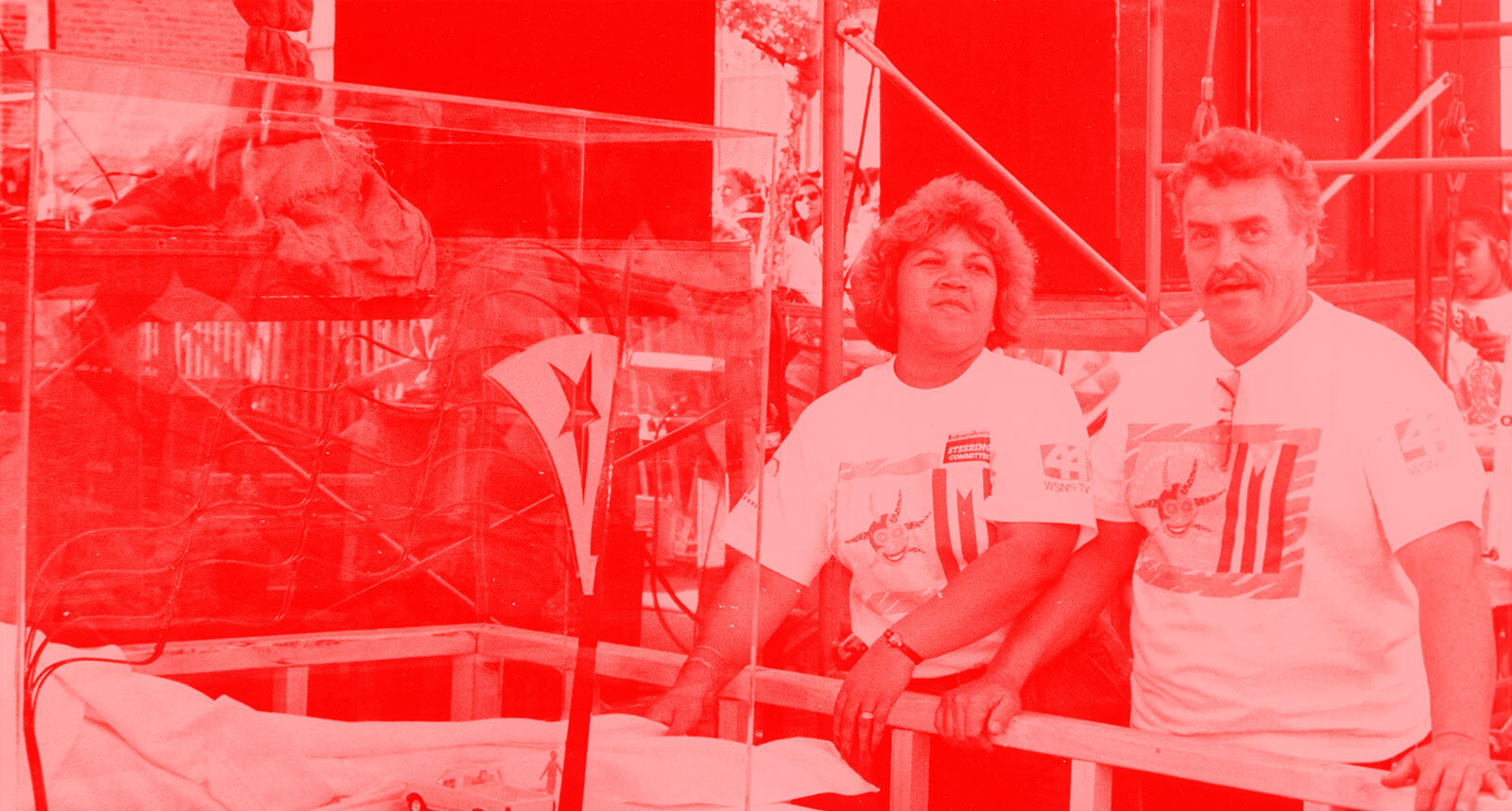
Image Licensing
ALL IMAGES ARE IN COPYRIGHT and all rights reserved by the Puerto Rican Arts Alliance (PRAA). Permission to copy, reproduce, and/or to purchase a photograph must be requested to:
El Archivo Project
3000 N Elbridge Ave. Chicago, IL 60618
Phone: 773-342-8865 x104
Email: archivo@praachicago.org
